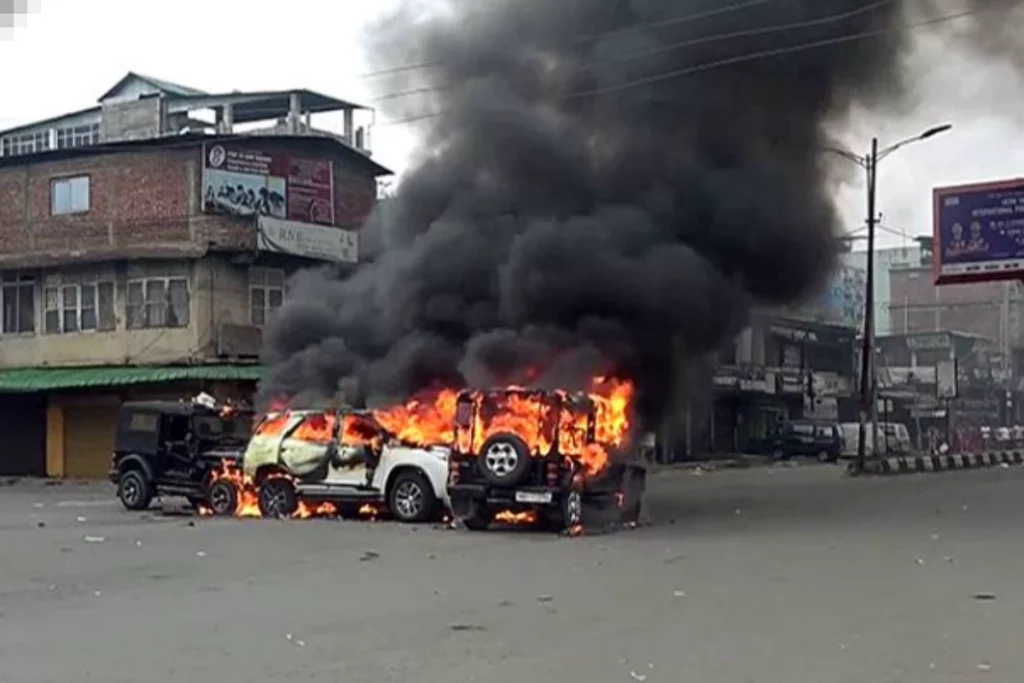Manipur is burning. It has been turned into a virtual ‘necropolis’, as some women of the state have said with acute pain, with killings in ethnic clashes continuing in the valley and the hills with frightening regularity. Interestingly, the Chief Minister of Manipur had stated on 28 May that “it is not a fight between communities” but “between the state and central forces against the terrorists who are trying to break Manipur.” By terrorists, he obliquely implied the Kuki community. Barely two days later on 30 May, the Chief of Defence Staff, General Anil Chauhan stated in a press conference that the situation in Manipur “has nothing to do with counter-insurgency or insurgency. It is primarily a clash between two ethnicities.” Similarly, Union Home Minister Amit Shah stated that the clashes in Manipur were “nasli hinsa”—racial or ethnic violence. In clear terms, both these authorities contradicted the Chief Minister’s version about insurgency.
Temples and Churches have been burnt down, more than 40,000 people are in refugee camps in their own state and, according to unofficial sources, more than 400 deaths are all indicators of a planned pogrom being carried out in that state.
The Hindoo Meitis living predominantly in the valley and Christian Kukis in the hills are battling for each other’s blood and a fratricidal war has broken out with sophisticated arms being used by groups supporting the warring communities. The state administration has collapsed. The state government and the Centre – both controlled by the BJP in the ‘Double Engine’ fashion since last 6 years – have miserably failed to tackle the situation which has spun frighteningly out of control. Add to that, Prime Minister Narendra Modi has been maintaining a studied silence for the past 45 days since the violence erupted.
This has prompted women groups in Manipur drawn from various ethnic groups, including the two in conflict, to send poignant appeals to the PM to break his silence and act decisively to stop the blood-letting. The convener of one such group has even asked the PM, “How dare you keep silent!” Prominent actor of Manipur and Padma Shri recipient Ratan Thiyam joined the chorus of demand for the PM to speak out since a colossal human tragedy is being enacted, engineered as it is by vested interests with political backing of the ruling party.
Chief Minister N Biren Singh, it is being said, has lost his credibility of neutrality and some Kuki MLAs belonging to his party have expressed their lack of confidence in him. Amit Shah visited the state at the height of the strife, but his prescription has not worked. The Centre has set up a committee to restore peace, but its composition is already mired in controversy. Ratan Thiyam has refused to be part of the committee. He has said there is need for “a strong political will” that would be demonstrated most eloquently if the PM sends the right message across.
Manipur, a lush green, hilly state which borders Myanmar, is home to an ethnically diverse group of Sino-Tibetan communities, each with their own language, culture and religion. Manipur was once a princely state under the British rule, and incorporated into India in 1949, two years after the country gained Independence. Many within the state disagreed with that move and ever since, the region has witnessed violent insurgencies and ethnic conflicts that have resulted in hundreds of deaths and injuries over the decades.
The ongoing turmoil has already seen some of the worst violence in recent years. There is huge criticism from the Opposition and critics, saying the PM and the BJP are showing a lack of empathy and urgency in tackling the problem and hence failing to stop the bloodshed.
Many intellectuals and civil society activists of Manipur have advanced the argument that successive governments in New Delhi have shown apathy towards the problems in the North-East in general and Manipur in particular. There are over 60 ethnic groups living in the state with distinct cultural and sociological characteristics. No serious efforts have been made to integrate them with the country’s mainstream. Which is why, they say, people from Manipur and other north-eastern states recently faced a spate of attacks in the capital and other places as they are considered “aliens.”
The prolonged use of Armed Forces Special Powers Act (AFSPA) has had a very negative impact on the social and political growth in this state. Historically, the state has always been toeing the line of whichever party is in power at the Centre. That also may be a major cause of political degeneration and decay. Without a strong regional political leadership, people are bound to suffer since national parties operate on their own agendas.
The delay in taking decisive action by the Centre and the state government only fuels rumours that the ruling party is setting the majority ethnic group – the Meitis – against the minority Kukis for political gain. The Meitis account for about 53 per cent of the population, according to the latest census, while the Kukis’ share of the state population is 14 per cent.
It has to be remembered that Manipur is a border state. The formula of ‘Double-Engine’ has obviously failed resulting in massive bloodshed. In the meanwhile, the state administration has debarred entry of MPs belonging to other parties who wanted to visit as a committee, thereby blocking any means of political inclusiveness in solving the problem. This can only mean that the ruling party, for some bizarre reasons, wants the violence and killings to continue.
